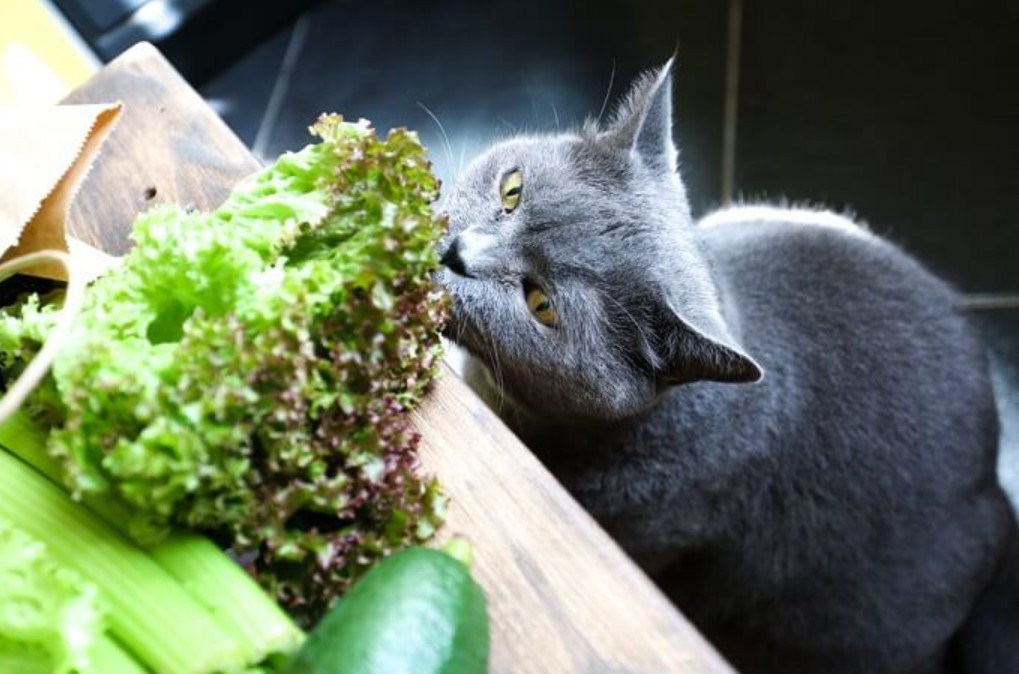Can Cats Eat Lettuce?
Can cats eat lettuce? If you’ve noticed your feline friend eyeing your salad, you might be curious whether this leafy green is safe for them. Cats are obligate carnivores, which means their diet should primarily consist of meat, but that doesn’t mean they can’t enjoy the occasional veggie snack. In this article, we’ll explore whether cats can safely eat lettuce, its potential health benefits, and how to introduce it to your cat’s diet in a safe and healthy way. Follow Cat Memorial Stones !!
Can cats eat lettuce? Is Lettuce Safe for Cats?

Yes, lettuce is generally safe for cats to eat in moderation. Unlike many human foods that are harmful or toxic to cats—such as chocolate, onions, or garlic—lettuce doesn’t contain any dangerous substances for felines. However, while it is non-toxic, it’s important to keep in mind that lettuce should not be a staple in your cat’s diet.
Lettuce is low in calories and primarily consists of water (around 95%). It contains small amounts of vitamins such as Vitamin A, Vitamin C, and Vitamin K, as well as some dietary fiber. While these nutrients are beneficial to humans, they don’t hold significant nutritional value for cats, as their digestive systems are designed to process animal-based proteins rather than plant-based foods.
The small amount of fiber in lettuce could potentially aid in digestion, but too much can cause gastrointestinal upset, including diarrhea or stomach discomfort.
Health Benefits of Lettuce for Cats
While lettuce doesn’t provide significant health benefits for cats compared to their usual protein-based diet, it can offer a few minor perks:
- Hydration: Since lettuce is mostly water, it can provide a bit of extra hydration, especially if your cat isn’t drinking enough water.
- Low-Calorie Snack: Lettuce is a very low-calorie food, which makes it a decent occasional treat for overweight cats or those prone to obesity.
- Fiber: A small amount of fiber may help with mild constipation or to promote regular bowel movements, though cats generally don’t need large amounts of fiber in their diet.
>>> Read: Can cats eat raisins?
Risks of Feeding Lettuce to Cats

While lettuce is not inherently harmful to cats, there are a few risks you should consider:
- Gastrointestinal Upset: If your cat eats too much lettuce, it may cause an upset stomach or diarrhea due to the fiber content.
- Pesticides and Chemicals: Store-bought lettuce may contain pesticides or other chemicals harmful to your cat. Always wash lettuce thoroughly before feeding it to your pet, or better yet, opt for organic varieties.
- Choking Hazard: Large pieces of lettuce could pose a choking risk, especially for smaller cats. Make sure to cut lettuce into small, manageable pieces.
How to Safely Feed Lettuce to Your Cat
If your cat seems interested in lettuce and you want to offer it as an occasional treat, here are some tips to ensure it’s done safely:
- Wash the lettuce: Remove any pesticides, dirt, or chemicals by thoroughly washing the lettuce.
- Serve in small portions: Cut the lettuce into small pieces to avoid choking and to make it easier for your cat to eat.
- Monitor your cat: When introducing any new food, including lettuce, keep an eye on your cat for any signs of gastrointestinal distress or allergic reactions.
- Avoid dressing and seasoning: Do not add any seasoning, oil, or salad dressings to the lettuce, as many of these ingredients can be harmful to cats.
Can Kittens Eat Lettuce?
Kittens have more sensitive digestive systems than adult cats and require a diet high in protein and fats for proper growth. While a tiny amount of lettuce won’t harm them, it’s best to focus on feeding kittens a high-quality, vet-approved diet rich in essential nutrients. Stick to meat-based foods and kitten-specific formulas to support their development.

Other Safe Vegetables for Cats
If your cat enjoys lettuce, they may also like other vegetables that are safe for cats to eat. Some of these include:
- Carrots (cooked, soft): High in beta-carotene and fiber.
- Pumpkin (cooked): Good for digestive health and easing constipation.
- Cucumbers: Another hydrating, low-calorie snack similar to lettuce.
- Green beans: Can be a good source of fiber and vitamins when cooked.
Final Thoughts: Should Cats Eat Lettuce?
In conclusion, while lettuce is safe for cats to eat in small amounts, it should not replace their primary diet of meat-based foods. If your cat shows interest in lettuce, you can offer it as an occasional treat. Just be sure to prepare it safely and monitor your cat for any adverse reactions. Always consult your veterinarian before making significant changes to your cat’s diet, especially if they have specific dietary needs or health conditions.
Lettuce can be a fun and harmless way to introduce a little variety to your cat’s diet, but it should remain a rare snack rather than a regular part of their meals. After all, cats thrive best on a diet rich in proteins and fats, tailored to their carnivorous nature.
FAQs
- Can cats eat iceberg lettuce?
Yes, cats can eat iceberg lettuce in moderation. While it’s not a necessary part of their diet and doesn’t offer significant nutritional benefits, it’s generally safe for them to consume.
- Can cats eat romaine lettuce?
Yes, cats can eat romaine lettuce in moderation. It’s a safe, low-calorie treat that can provide some vitamins and minerals. However, it’s important to note that cats are primarily carnivores and their diet should be primarily meat-based.
- Can cats eat lettuce and spinach?
Yes, cats can eat lettuce and spinach. These leafy greens are generally safe for them to consume in moderation. They can be a good source of vitamins and minerals, especially if your cat isn’t getting enough in their regular diet.
- Can cats eat butter lettuce?
Yes, cats can eat butter lettuce in moderation. While it’s not a necessary part of their diet, it’s generally safe for them to consume. Butter lettuce is low in calories and can provide some hydration.
- Can cats eat lettuce raw?
Yes, cats can eat lettuce raw. As long as it’s washed thoroughly to remove any pesticides or dirt, raw lettuce is generally safe for them to consume. It’s a low-calorie treat that can also provide some hydration.
>>> Click Can cats eat popcorn?
